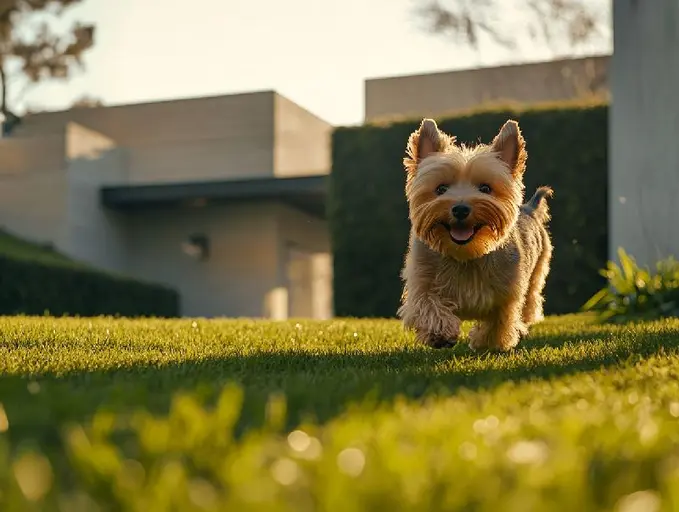Yorkshire Terrier: The Ultimate Guide to Your Pocket-Sized Companion

Brief Introduction
The Yorkshire Terrier, affectionately known as the Yorkie, is a toy breed that packs a lot of personality into a small package. Instantly recognizable for its long, flowing, silky coat and confident demeanor, the Yorkie is a popular companion dog. Their alert, intelligent eyes and playful spirit make them delightful additions to many homes. What makes them so attractive? Their portability, relatively low-shedding coat (making them a good choice for some allergy sufferers), and their affectionate nature endear them to owners worldwide. They can adapt to apartment living and enjoy being the center of attention. However, don’t let their size fool you; Yorkies have a terrier’s tenacity and can be quite vocal!
Breed History
The Yorkie’s story begins in 19th century Yorkshire, England. During the Industrial Revolution, Scottish weavers migrated to Yorkshire, bringing with them various types of terriers. These dogs were primarily used to control rodent populations in mills and mines. The exact breeds that contributed to the Yorkie’s ancestry are debated, but likely include the Waterside Terrier, Clydesdale Terrier, and Paisley Terrier.
Over time, breeders began to select for smaller size and a more refined appearance. They transformed these working dogs into the elegant companions we know today. The breed was officially recognized by the Kennel Club (England) in 1886, and quickly gained popularity. The Yorkshire Terrier soon made its way to America, becoming a popular lapdog among wealthy families. From humble working roots, the Yorkie ascended to pampered pet status.
Appearance
Despite their diminutive size, the Yorkie boasts a distinctive and elegant appearance.
Height and Weight
Yorkies are tiny! The breed standard specifies a weight of no more than 7 pounds. Their height typically ranges from 8 to 9 inches at the shoulder.
Coat
The Yorkie’s most defining feature is its long, silky coat. The hair is fine and glossy, falling straight down on either side of the body. Puppies are born with a black and tan coat, which gradually transitions to a steel blue and tan as they mature. Regular grooming is crucial to maintain its health and beauty.
Ears
The Yorkshire Terrier has small, V-shaped ears that stand erect. They should be set high on the head and covered with short hair.
Eyes
Their eyes are dark, sparkling, and intelligent, expressing their lively personality.
Tail
The tail is typically docked to a medium length (although tail docking is becoming less common and sometimes illegal). It is carried slightly higher than the level of the back.
Other Characteristic Features
- Their small, delicate bones contribute to their elegant appearance.
- Their gait should be smooth and flowing.
- The overall appearance is one of elegance and refinement.
Character and Behavior
Yorkies are known for their big personalities. Don’t let their size fool you, they have a typical terrier temperament.
Attitude Towards People
Yorkies are generally affectionate and devoted to their families. They can be prone to separation anxiety if left alone for long periods. Early socialization is essential to ensure they are well-adjusted and comfortable around strangers.
Attitude Towards Children
While Yorkies can be good family pets, they are often better suited to older children who understand how to handle them gently. Young children may accidentally injure them due to their small size and delicate bones. Supervise interactions between Yorkies and children closely.
Attitude Towards Animals
Yorkies can be territorial and may not always get along with other dogs, especially larger breeds. They might display “small dog syndrome”, acting aggressively towards bigger dogs to compensate for their size. Early socialization with other animals is vital. They may also chase smaller animals like cats, due to their terrier instincts.
Activity Level
While not overly energetic, Yorkies do need daily exercise. A short walk or playtime indoors can be sufficient. They enjoy playing with toys and exploring their surroundings.
Trainability
Yorkies are intelligent but can be stubborn. They respond best to positive reinforcement training methods, such as treats and praise. Consistency and patience are key. Housebreaking can be challenging, so crate training is often recommended.
Breed Characteristics
- Alert and watchful: they make excellent watchdogs, barking at anything unusual.
- Affectionate and playful with their families.
- Can be prone to barking.
- Independent and sometimes stubborn.

Care and Maintenance
Proper care is essential to keep your Yorkie healthy and happy.
Care Features
The Yorkie’s coat requires significant maintenance. Daily brushing is necessary to prevent mats and tangles. Regular bathing is also important, typically every 1-2 weeks. Many owners opt to keep their Yorkie’s coat trimmed short for easier care.
Exercise
Yorkies don’t require a lot of exercise, but daily walks and playtime are important for their physical and mental well-being.
Feeding
Feed your Yorkie a high-quality dog food formulated for small breeds. Be careful not to overfeed them, as they can easily become overweight.
Haircut and Combing
As mentioned earlier, daily brushing is crucial. Many owners choose to trim their Yorkie’s coat to a manageable length. Professional grooming is recommended every few months. Some popular Yorkie haircuts include the puppy cut, the teddy bear cut, and the show cut (which requires meticulous maintenance).
Health
Yorkies are generally healthy, but they are prone to certain health problems.
Possible Problems
- Patellar luxation: a common condition where the kneecap slips out of place.
- Tracheal collapse: a condition where the trachea (windpipe) weakens and collapses, causing breathing difficulties.
- Hypoglycemia: low blood sugar, especially in puppies.
- Portosystemic shunt: an abnormal blood vessel that bypasses the liver.
- Progressive retinal atrophy (PRA): a degenerative eye disease.
- Dental problems: Yorkies are prone to dental issues, so regular dental cleanings are important.
Regular veterinary checkups can help detect and manage these health problems.
Breed Weaknesses
While Yorkies are wonderful companions, they do have a few potential weaknesses.
Level of Aggression
They are not typically aggressive by nature but they are prone to excessive barking, especially if not properly trained. They can also be territorial and may snap or bite if they feel threatened or handled roughly. Early socialization and training are important to minimize any potential aggression.
Loyalty
Yorkies are loyal to their families, but they can be wary of strangers. Socialization from a young age is critical to help them become well-adjusted and confident.
Specific Weaknesses
- Fragile: Their small size and delicate bones make them susceptible to injury.
- Prone to dental problems: Regular dental care is essential.
- Can be difficult to housebreak.
Conclusion
The Yorkshire Terrier is a delightful companion for the right owner. They are affectionate, playful, and relatively low-maintenance in terms of exercise. However, they require significant grooming, are prone to certain health problems, and can be challenging to train. They are best suited for owners who are willing to dedicate time to grooming, training, and providing them with a safe and loving environment. If you’re looking for a small and affectionate dog with a big personality, the Yorkie might just be the perfect breed for you!
Frequently Asked Questions About Yorkshire Terrier
What is a Yorkshire Terrier’s general temperament?
How much grooming does a Yorkshire Terrier need?
Are Yorkshire Terriers good with children?
Do Yorkshire Terriers need a lot of exercise?
Are Yorkshire Terriers easy to train?
What are common health problems for Yorkshire Terriers?
- Patellar luxation (knee cap dislocation)
- Tracheal collapse (collapse of the windpipe)
- Hypoglycemia (low blood sugar)
- Portosystemic shunt (abnormal blood vessel bypassing the liver)
- Progressive retinal atrophy (PRA)
- Dental problems

